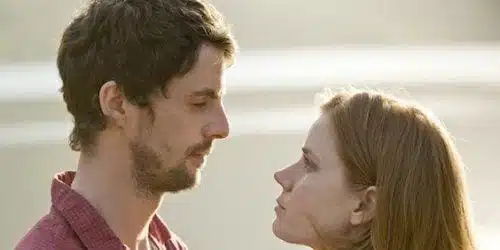
Leap Year has all the makings of a dastardly romantic comedy. It stars a fussy, well-off big-city girl (Amy Adams) who is actually (surprise!) quite self-centred and myopic. Through astonishing contrivance, she comes to wind up in an unfamiliar location (it happens in this film to be Ireland), with a gruff and unfamiliar man (Matthew Goode), who comes to be her companion on a journey. This journey, you see, is not purely physical, but also transformative, for by the end our modest heroine will come to see the error of her ways, and open her mind to the values she has learnt along the way.
There’s something very patronising at the core of this film’s conceit. Sure, if you make a point of going to see Leap Year, you probably know what you’re going to get, which begs the question: why bother disparaging it for that? But then, by that token, why bother to make it? If pointing out just why it’s so bad – total adherence to formula, a hint of contempt for women, far-fetched and unfunny gags, total predictability – is obvious, then wouldn’t these shortcomings be just as obvious to a film-maker putting it together? Were they interested in challenging their audience at all?
There are a couple of light moments in Leap Year, and the potential for some interest in the storyline, but it’s all rubbed in such fakery as to be nigh unbearable. The first ten minutes of the movie go to some pains to depict all the characters narcissistically trying on dresses. Ms. Adam’s character, called Anna, enunciates persistently that she is a ‘stager’ – she stages furniture in houses to attract buyers, and then removes it again. ‘Ah,’ responds the audience, ‘We get the point. She’s being set up for a fall!’ And sure enough, this will be of significance later in the film, in a discussion with her new companion about occupation. Oh, and those high heels she is seen teetering around in during the opening credits – definitely a set-up for a future gag.
One needs only to recount the film’s plot to make it sound awful. Anna has a prospective fiancee who is clearly a dud, and she is clearly destined, in Scarlett O’Hara fashion, to fall in love with the man she spends most of the film bickering with. This is Matthew Goode’s Declan, who for some reason follows her all the way from Dingle to Dublin, despite her accidentally dumping his car in a river. Through his disdain, the film believes (?), Anna will come to be a better person.
The Irish are portrayed broadly through many blasé stereotypes, which is surprising considering the film is directed by Anand Tucker; being English, he should conceivably know more about rural Irish life. In Leap Year, they’re kind-of endearing albeit backward and superstitious buggers. They have bad manners, eat greasy and/or gross food, and love cod-Irish music. They don’t get much done, but of course there has to be a fight in a bar, and at one stage Declan, in true country style, pulls the head off a chicken. In a truly weird moment, this seems to turn Anna on.
Both of the leads are way above the material given to them. Goode has a few decent facial expressions, and the best lines. He spends most of the film looking slightly bewildered, like he walked onto the wrong set. As for Amy Adams, how could she do this to us? Normally radiant, here she trudges through her part looking baby-faced, and is even made to yell on an aeroplane, “I’m not going to die without getting engaged!” It’s puzzling why an actress of her ability would want to lower herself to this extraordinarily tedious rom-com fare. That’s the real dilemma of Leap Year, far surpassing any of these invented ones in the actual film:
Will the animosity between Anna and Declan ever become love?
Will she fall for the small-town Irish charm?
Will she have to kiss strange Declan a la The Proposal while they are pretending to be a married couple? Will she kinda like it?
Will she discover her fiancee truly doesn’t love her?
Will she participate in a heartstring-tugging denouement in a public restaurant?
There are no surprises to be found in the answers to any of these questions. But Leap Year remains determinedly, improbably upbeat throughout, which I suppose has to count for something.
